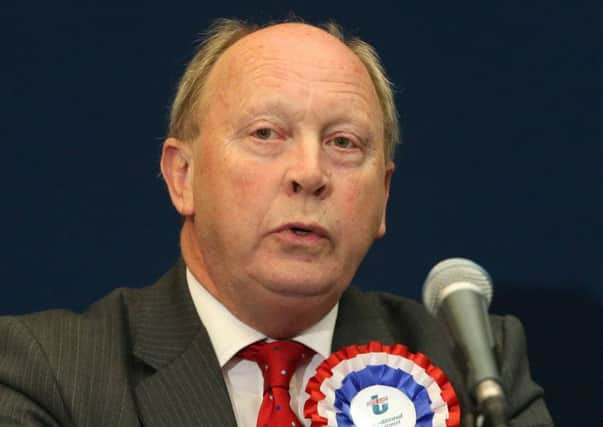I'm too young to retire, says Allister as he goes back to Assembly alone


The News Letter asked Mr Allister if he was disappointed at the outcome, in which he failed to bring in another TUV MLA despite his party’s share of the vote increasing from 2.5 per cent in the 2011 Stormont election to 3.4 per cent in last week’s poll.
“I have not concealed the fact that I am disappointed,” he said. “I am gratified with the situation in North Antrim, where our vote rose.
Advertisement
Hide AdAdvertisement
Hide Ad“Henry Reilly also got a good vote in South Down. But I am sorry we didn’t get more traction elsewhere.”
Mr Allister added: “The people have voted. They may live to regret it — they have voted for the things they complain about.”
Asked if he had considered stepping down from politics in light of his failure to achieve his stated pre-election goal of getting at least a second Assembly TUV representative, Mr Allister said: “I am not retirement age yet.”
The TUV party overtook Ukip’s 2015 total by gaining 23,776 first round votes in Thursday’s election, bettering the TUV’s own performance in the general election by 5,000 votes.
Advertisement
Hide AdAdvertisement
Hide AdMr Alister personally gained 5,399 first preference votes and was the first candidate to be elected in North Antrim.
Last month, he told the News Letter that the TUV’s campaign could not be considered a success unless the party returned more than one MLA.
“If the TUV didn’t win any seats in this election, that would be failure written in capital letters. Of course it would.”
Former Ukip councillor Henry Reilly stood for the TUV in South Down and was the party’s next most successful candidate. Mr Reilly received 2,718 first round votes for a 6.6 per cent share but was eliminated in the second round.
Advertisement
Hide AdAdvertisement
Hide AdAt the North Antrim count, Sinn Fein MLA Daithi McKay described the TUV as a “failed project”, noting that Mr Allister would “once again be alone at Stormont”.
Meanwhile, support for Ukip dropped dramatically as the party failed to improve on its Wesminster result last year.
Despite Nigel Farage’s insistence that Ukip would win seats in every election across the UK on what was dubbed ‘Super Thursday’, no candidate was able to secure an Assembly seat.
Mr Farage made six trips to Northern Ireland in the run up to polling day but it appears his presence failed to inspire voters to turn out.
Advertisement
Hide AdAdvertisement
Hide AdUkip received 18,324 first preference votes in 2015 but that total collapsed to just 10,109 last week.
Neil Jordan, a firefighter and Carrickfergus councillor, narrowly missed out on election for the party in East Antrim.
Mr Jordan received 2,207 first preference votes, 6.8 per cent of the share, but he failed to gain enough transfers to unseat Sinn Fein’s Oliver McMullan.
Less than one hundred votes separated the two candidates in the final round as the DUP’s Alistair Ross was also elected.
Advertisement
Hide AdAdvertisement
Hide AdParty leader and former MLA David McNarry, who was elected while in the UUP, oversaw the party’s campaign despite announcing that he was retiring from politics last month.
The campaign ran into difficulty when he claimed that just £25 million would be enough to eradicate hospital waiting lists, but Mr Farage later admitted the amount may be insufficient.
In a statement on Saturday afternoon after the results were announced, Mr McNarry said the party was “here to stay”.
“We remain committed to Northern Ireland and our presence is a work in progress.
Advertisement
Hide AdAdvertisement
Hide Ad“The Ukip candidates team are already preparing for the crucial referendum vote in June when we believe Northern Ireland will register a strong Brexit vote,” added Mr McNarry.
Ukip’s share of the first preference vote was 1.5 per cent, a decline of 1.1 per cent in comparison with the party’s performance in the general election.